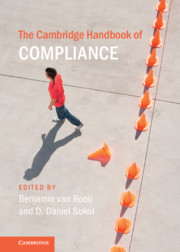Book contents
- The Cambridge Handbook of Compliance
- The Cambridge Handbook of Compliance
- Copyright page
- Contents
- Figures
- Tables
- Contributors
- 1 Introduction: Compliance as the Interaction between Rules and Behavior
- Part I Compliance Concepts and Approaches
- Part II Deterrence and Incapacitation
- Part III Incentives
- Part IV Legitimacy and Social Norms
- Part V Capacity and Opportunity
- Part VI Compliance and Cognition
- 36 Heuristics and Biases in the Criminology of Compliance
- 37 Prospect Theory and Tax Compliance
- 38 Nudging Compliance
- Part VII Management and Organizational Processes
- Part VIII Measuring and Evaluating Compliance
- Part IX Analysis of Particular Fields
- References
37 - Prospect Theory and Tax Compliance
from Part VI - Compliance and Cognition
Published online by Cambridge University Press: 07 May 2021
- The Cambridge Handbook of Compliance
- The Cambridge Handbook of Compliance
- Copyright page
- Contents
- Figures
- Tables
- Contributors
- 1 Introduction: Compliance as the Interaction between Rules and Behavior
- Part I Compliance Concepts and Approaches
- Part II Deterrence and Incapacitation
- Part III Incentives
- Part IV Legitimacy and Social Norms
- Part V Capacity and Opportunity
- Part VI Compliance and Cognition
- 36 Heuristics and Biases in the Criminology of Compliance
- 37 Prospect Theory and Tax Compliance
- 38 Nudging Compliance
- Part VII Management and Organizational Processes
- Part VIII Measuring and Evaluating Compliance
- Part IX Analysis of Particular Fields
- References
Summary
Abstract: This chapter discusses prospect theory as an alternative approach in explaining tax compliance behavior. (Non)Compliance is frequently modeled as the outcome of a decision under risk, that is, the choice between a safe option of being compliant and a risky option of not complying with the law. Noncompliance results in either a better or a worse outcome than compliance, depending on whether the behavior is audited and penalized. The most prominent descriptive model to explain risky decisions is prospect theory. Many of this theory’s core ideas have been applied in theoretical and empirical studies of compliance. After a brief overview of prospect theory, this chapter summarizes empirical studies as examples for prospect theory inspired compliance research. It closes with a summary and critique of this approach.
- Type
- Chapter
- Information
- The Cambridge Handbook of Compliance , pp. 541 - 550Publisher: Cambridge University PressPrint publication year: 2021
References
- 1
- Cited by



